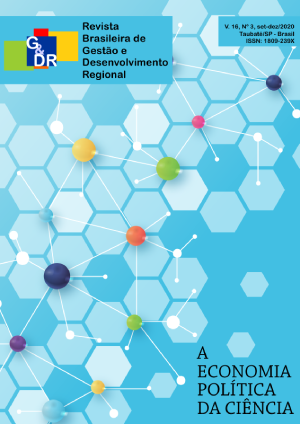INDICAÇÃO GEOGRÁFICA PARA O DESENVOLVIMENTO TERRITORIAL: CRÍTICAS E DIMENSÕES NO CASO DA INDICAÇÃO DE PROCEDÊNCIA SERRO (BRASIL)
Palavras-chave:
Políticas Públicas. Desenvolvimento Territorial. Indicações Geográficas. SerroResumo
As indicações geográficas (IG) fazem parte dos instrumentos da Propriedade Intelectual. É um signo usado em produtos ou serviços que têm uma origem geográfica específica e possuem qualidades ou reputação que são devidas a essa origem. Reflete uma combinação única de recursos naturais, ativos culturais e história em um determinado território. No Brasil, a política de IG faz parte das políticas de desenvolvimento rural. Embora funcionem como diferenciadores de produto no mercado, as IGs também servem para o desenvolvimento territorial, devido à ligação com o território e o processo coletivo necessário ao seu reconhecimento. Assim, este trabalho teve como objetivo analisar que aspectos do desenvolvimento são alcançados curto prazo após o reconhecimento de uma indicação geográfica. A indicação da procedência do Serro foi escolhida devido ao período de reconhecimento e à importância do produto (queijo artesanal) em Minas Gerais. A pesquisa exploratório-descritiva foi realizada pelo método de estudo de caso, com entrevistas em profundidade e análise documental. No caso estudado, o desenvolvimento territorial não foi plenamente alcançado. Os impactos relacionados ao capital físico-econômico, humano e social foram listados. No entanto, a análise mostrou que a eficácia das indicações geográficas é baseada em atividades administrativas, comerciais, políticas e sociais.Downloads
Publicado
20.10.2020
Como Citar
Medeiros, M. de L., Terra, L. A. A., Passador, C. S., & Passador, J. L. (2020). INDICAÇÃO GEOGRÁFICA PARA O DESENVOLVIMENTO TERRITORIAL: CRÍTICAS E DIMENSÕES NO CASO DA INDICAÇÃO DE PROCEDÊNCIA SERRO (BRASIL). Revista Brasileira De Gestão E Desenvolvimento Regional, 16(3). Recuperado de https://www.rbgdr.net/revista/index.php/rbgdr/article/view/5874
Edição
Seção
Artigos
Licença
Os autores que tiverem seus trabalhos aceitos e publicados na Revista Brasileira de Gestão e Desenvolvimento Regional estarão sujeitos a política de direitos autorais CC https://creativecommons.org/licenses/by/4.0/.
Em caso de aceite do artigo para publicação, os direitos autorais são automaticamente cedidos para a Revista Brasileira de Gestão e Desenvolvimento Regional.

















